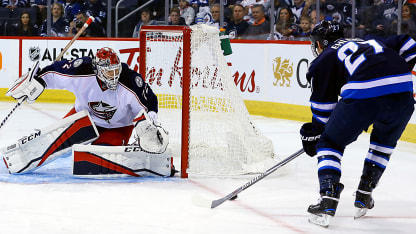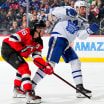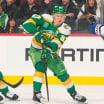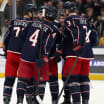As hard as it might be to guess how many people around the world will pledge to lose weight in 2017 as part of their New Year's resolutions, it might be tougher to imagine how anyone can top what Columbus Blue Jackets goaltender Sergei Bobrovsky did last summer.
After missing 35 games last season because of three groin injuries, Bobrovsky lost 17 pounds during the offseason. And though there might be a lot of people who drop more weight on New Year's diets, it's doubtful any of them do so without also losing significant amounts of fat. What makes Bobrovsky's weight loss remarkable is it was almost all muscle.
Sergei Bobrovsky of Blue Jackets has lighter outlook
Loss of 17 pounds has led to gain in wins column for Columbus goaltender

By
Kevin Woodley
NHL.com Independent Correspondent
"The groin injuries concerned me a lot last season, so I made little tricks in my preparation in the summer and my daily routine during the season," Bobrovsky said. "For goalies, we rely a lot on cardio for endurance and if you are going to be a little bit lighter, it helps you to move so that's what I thought and that's what I did. I dropped [some weight] and when I went on the ice I felt a lot better and I thought, 'Whoa, that's nice,' and so I did more."
The physical change has paid off for Bobrovsky, who looks more like the goalie who won the Vezina Trophy in 2012-13 with 32 wins, a 2.38 goals-against average and .932 save percentage. That number dipped to .908 last season, but Bobrovsky leads the NHL with 23 wins, is second in GAA (1.95), tied for second in save percentage (.934), and is the biggest reason Columbus is on a 14-game winning streak, tied for third-longest in League history.
"We are nowhere near where we are right now if we're not on his back," coach John Tortorella said.
Perhaps more importantly, the Blue Jackets are comfortable Bobrovsky can keep carrying them because he's not carrying the extra muscle that contributed to recurring groin problems.
Just as important, said Bobrovsky, are the adjustments he made to his daily routine. Nelson Ayotte, who was hired as a high performance consultant in the summer, agreed.
"There is also a big emphasis on the structural balance training part of his preparation," Ayotte wrote in an email. "You are as strong as your weakest link, so you need to find the weak link and work on it. … Bob is really in touch with his preparation and I have rarely worked with an athlete that is as educated as he is regarding athletic preparation."
Bobrovsky is officially listed at 182 pounds after carrying 199 pounds on his 6-foot-2 frame last season. It's hard not to notice the change, but for Blue Jackets backup Curtis McElhinney, the bigger surprise was seeing the physical change in Bobrovsky after the previous offseason.
"He was darn near the same size as me, which is a little unusual for him, packed on all that muscle," said McElhinney, who is listed at 6-foot-3 and 200 pounds. "He is always finding ways to get better, so it was more of 'test out this route and see how it goes' and obviously it didn't work out for him. He was in great shape last year too, it was just muscle, and I don't know if it was necessarily the right thing for his body type and style of play."
That style always included explosive lateral movement. Bobrovsky hoped to add even more power to those pushes when he bulked up, but in addition to creating groin problems he seemed to lose some of his quickness.
It's not unlike a forward trying to get bigger and stronger only to lose speed, or vice versa, McElhinney said. Changing his focus this season allowed Bobrovsky to regain some of that lateral speed but the power he worked so hard to add last summer is also paying off now.
"Training is a process, and what he did last year in terms of adding muscle is as important as what he did this year," wrote Ayotte, who spent five days with Bobrovsky at the Red Bull facilities in Salzburg, Austria, where he has trained the past six summers. "For instance the strength/power he gained last year is serving him this year as well. The goal of this year was to maintain that new level of strength and power while reducing body weight, which he did."
For all the focus on physique, Tortorella also believes Bobrovsky became mentally tougher last season, which included losing his first six starts before coach Todd Richards was fired.
"He said it last year, he felt he cost [Richards] his job and I just thought he stood in there when he made that comment, so you know he felt that," said Tortorella, who compared Bobrovsky's intensity to Henrik Lundqvist of the New York Rangers. "He's not happy what happened last year and he's one of the proudest athletes I have been around. I think he's grown mentally even more than physically and he has even more of a toughness about him mentally."
Bobrovsky also spent time last summer on and off the ice with Hannu Nykvist, who coaches the Red Bull goalies and is the former director of Finland's national goalie program.
"He opens up your perspective on new things, puts some light on new areas, I would say," Bobrovsky said. "It's more the mental look at the game, mental things that are tough to explain."
Bobrovsky was similarly hesitant to explain the specific alterations in his off-ice routine, but after making significant stance and technique changes during five seasons with Columbus goalie coach Ian Clark, it's not surprising to hear the Russian goalie added some of Nykvist's ideas to his repertoire.
"Of course," Bobrovsky said. "The goalie is a journey and you try on things and then you take it or leave it but you always move forward. It's all about experience."
For Bobrovsky, the journey has been easier and the experience more enjoyable this season without having to carry an extra 17 pounds.

















